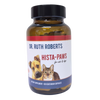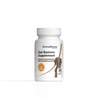If your cat has been dealing with random bouts of diarrhea, throwing up hairballs more often than usual, or just seems a little off lately—you’re not alone. Many cat parents chalk it up to “just a sensitive stomach,” but the truth is, these signs often point to something deeper: an unbalanced gut.
More vets and pet nutritionists are now talking about how gut health influences everything from your cat’s digestion to their skin, energy levels, and immune system. That’s where probiotics for cats come in. These tiny, good-for-you bacteria might just be the quiet heroes your cat’s been missing—and they’re easier to add to your routine than you might think.
Why Probiotics Matter for Cats
Probiotics for cats play a crucial role in gut health, which is directly linked to immune strength, nutrient absorption, and even behavior. Just like in humans, a cat’s digestive tract is home to trillions of bacteria—some helpful, some harmful. When the balance is off, your cat may experience issues like:
-
Diarrhea or constipation
-
Poor appetite or nutrient deficiencies
-
Vomiting or frequent hairballs
-
Skin problems or a dull coat
-
Low immunity or frequent illness
Probiotics help by restoring a healthy balance of gut bacteria, making digestion smoother and your cat’s body more resilient to stress, infection, or food sensitivities.
The Benefits of Giving Your Cat a Probiotic
Here’s what current veterinary research says:
1. Supports Digestive Health
A study in the Journal of Feline Medicine and Surgery (2011) found that cats with chronic diarrhea improved significantly after taking probiotics like Enterococcus faecium. The probiotics helped stabilize the gut flora and reduce gut inflammation.
2. Boosts Immune Function
According to Veterinary Microbiology (2017), probiotics for cats can help stimulate antibody production and improve mucosal immunity—especially useful after illness or periods of high stress.
3. Reduces Antibiotic Side Effects
Antibiotics wipe out both harmful and beneficial bacteria. A good probiotic for cat can help restore microbial balance and reduce side effects like antibiotic-associated diarrhea.
4. Improves Coat and Skin Health
Some pet parents notice fewer skin flare-ups and shinier coats after introducing probiotics, likely due to improved digestion and nutrient utilization.
What Is the Best Probiotic for Cats?
When looking for the best probiotic for cats, it’s not just about the label—it’s about what’s inside. Choose products that:
✅ Designed for feline digestion
✅ Clearly list the CFU count (colony-forming units) to indicate potency
✅ Include multiple strains of beneficial bacteria for broad-spectrum support
✅ Are free from preservatives and allergens like dairy or soy
Also, look for these cat-friendly probiotic ingredients:
-
Lactobacillus acidophilus – Helps break down food, reduce bloating, and improve stool quality
-
Bifidobacterium animalis – Supports regularity and reduces diarrhea or constipation
-
Enterococcus faecium – A go-to strain for cats with chronic GI issues
-
Saccharomyces boulardii – A beneficial yeast that helps manage diarrhea and restore gut balance after antibiotics
-
Spore-forming Bacillus strains (like B. subtilis, B. clausii) – Resilient strains that survive stomach acid and colonize the intestines
-
Prebiotics like inulin or FOS – Feed beneficial bacteria and enhance probiotic effectiveness
If your cat has sensitivities or is recovering from antibiotic use, formulas with Saccharomyces boulardii or soil-based organisms can be especially helpful.
Want to see which formulas we recommend? Check out:
-
Microbiome Labs Cat Probonix: – Liquid probiotic with Enterococcus faecium, L. reuteri, L. rhamnosus
-
Felix’s Flora by Adored Beast: A multi-strain, species-specific probiotic with prebiotics and postbiotics, designed to restore gut balance in cats—especially after antibiotics or digestive stress.
-
RestorFlora: Therapeutic probiotic with Saccharomyces boulardii, B. clausii, and B. subtilis for managing diarrhea and rebuilding gut balance after antibiotics.
Should You Try Probiotic Cat Food?
Probiotic cat food is a type of cat food that contains added live beneficial bacteria, known as probiotics, which are intended to support your cat’s digestive and immune health. These helpful microbes aid in maintaining a balanced gut microbiome—something that’s vital for nutrient absorption, stool consistency, and overall wellness.
Some premium cat foods now include added probiotics. This makes it easier to provide daily gut support without an extra supplement. While probiotic cat food can be helpful, make sure the live cultures are added after cooking to ensure potency.
For cats with more serious GI issues or recent antibiotic use, a standalone probiotic may be more effective than food alone.
Final Thoughts: Are Probiotics for Cats Worth It?
Absolutely. From easing digestion and boosting immunity to improving coat condition and resilience, probiotics for cats are one of the simplest and most impactful ways to support long-term feline wellness.
Whether you're feeding a probiotic-enhanced food or using a daily supplement, the right strains can make a noticeable difference—especially when combined with a species-appropriate, gut-supportive diet.
👉 Ready to get started? Explore our top picks:
Microbiome Labs Cat Probonix – easy to administer and gentle on sensitive stomachs
Felix’s Flora by Adored Beast – a feline-specific blend of prebiotics, probiotics, and postbiotics
RestorFlora – ideal for cats recovering from antibiotics or digestive upset
🧡 Pair your probiotic with the Original CrockPET Diet™ to nourish the gut from the inside out and help good bacteria thrive.
🐾 Got a dog too? Don’t miss our guide: 6 Clear Signs Your Dog Needs Probiotics & How to Help. Because good gut health benefits every member of the family.
















